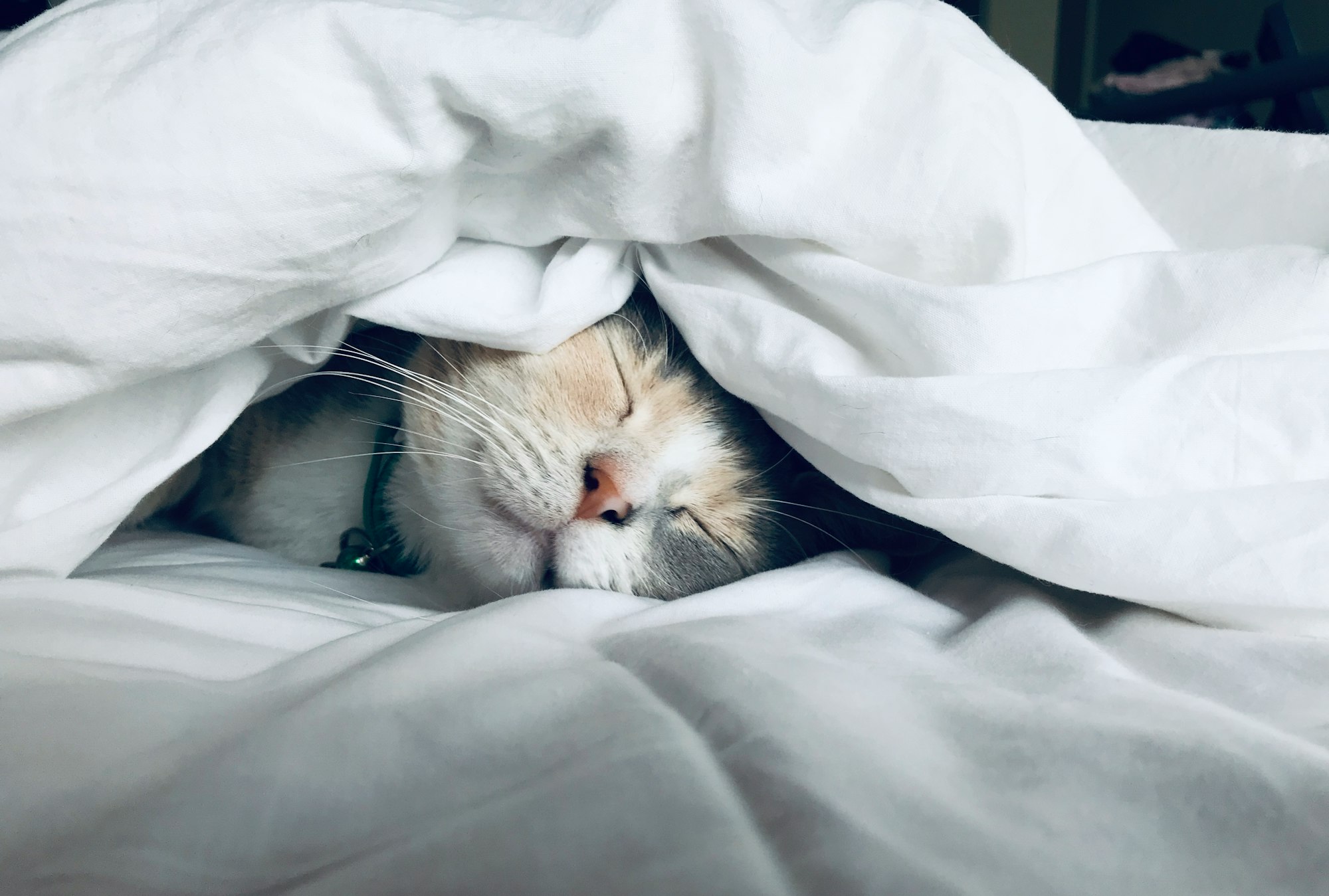To Sleep or Not to Sleep
Let's talk about the effects of sleep deprivation, why sleep is important, and some tips on how to get a better night's rest!

Author: Alexandra Boulware, PharmD
Editor: Brentsen Wolf, PharmD
Why exactly is sleep vital for day-to-day function? What does sleep deprivation look like? What are the short and long-term consequences of insufficient sleep? This post will review these points and more related to lack of sleep and the effects on the human body.

Introduction
Think back to a night that was spent tossing and turning, or else one that consisted of playing videogames or binge-watching a series on Netflix until the wee hours of the morning. I can remember more than one study session I had during pharmacy school reviewing endless PowerPoints and class notes, which ultimately resulted in a night of little to no sleep. Definitely not fun! Everyone has had their share of late nights, whether due to being unable to fall asleep or a regretful decision to stay up longer than you should. But what are the consequences of sleep deprivation, especially when it starts becoming a regular habit? Sleep science is NOT easy, but understanding what sleep deprivation is, how adequate sleep influences healthy living, and what regular habits may reduce poor sleep can assist in achieving a better night’s rest.
Why Sleep is Essential
Sleep is an important component of daily living that is not only a top contender in maintaining your health, but also a factor that influences your overall well-being.
Like the engine of a car without a chance to rest or restart, your body won't operate as cohesively or as effectively with improper sleep. Consistent sleep allows for the body to appropriately regulate the cardiovascular and circulatory systems, adequately maintain endocrine function including the release of testosterone and estrogen, manage digestion and metabolism such as the body’s ability to respond to insulin and store fat, and is a vital element for an efficient response in the immune and nervous systems. According to the National Heart, Lung, and Blood Institute (NIH), sufficient sleep influences brain function and a person’s physical health, but it's also necessary for supporting growth and development, particularly in children and teens. This is why longer hours of sleep are encouraged amongst the youth and throughout puberty.
Sleep also influences your mental health and memory. Moving through the various stages of NREM (non-rapid eye movement) and REM (rapid eye movement) sleep, enables the body to process events from the day and convert them from short to long-term memories. Emotions are also tightly controlled by the stages of sleep. As brain activity picks up or slows down at various points in the sleep cycle, it reinforces a person’s ability to think, learn, memorize, and process emotions. The body navigates through the sleep cycle on its own each night, however, this process only occurs when enough time has passed to allow for a restful sleep.
So, how much sleep does a person need? There’s no exact answer, but there are guidelines set by the Centers for Disease Control and Prevention (CDC), as well as organizations such as the American Academy of Sleep Medicine (AASM) which help to break down the ideal amount of sleep for a person based on their age. On average, the AASM recommends that adults between ages 18-60 strive for 7 hours of sleep per night. See the table below for more specifics and keep in mind these are only recommended sleep ranges based on a person’s age. Adjustments may be necessary for each individual’s lifestyle.
|
AGE |
RECCOMENDED NIGHTLY
SLEEP RANGE |
|
Newborns, 0-3 months |
14-17 hours |
|
Infants, 4-11 months |
12-15 hours |
|
Toddlers, 1-2 years |
11-14 hours |
|
Preschool Children, 3-5 years |
10-13 hours |
|
School-age Children, 6-13 years |
9-11 hours |
|
Teenagers, 14-17 years |
8-10 hours |
|
Young Adults, 18-25 years |
7-9 hours |
|
Adults, 26-64 years |
7-9 hours |
|
Adults, 65+ years |
7-8 hours |
Sleep Deprivation
Sleep deprivation is actually very common. In fact, the CDC has indicated that 1 in 3 adults in the United States do not get enough sleep on a routine basis. Patterns of who is most impacted by sleep deprivation can also be seen amongst different races/ethnicities, geography, employment, and marital status according to research conducted by the CDC.

ACUTE vs CHRONIC:
Sleep deprivation is simply defined by the Sleep Foundation as getting less than the needed amount of sleep per night, but there's more to it than that. Interestingly, it's not just the number of hours of sleep you get that's important. For example, a person may not be well-rested even if they meet the designated age recommendation. Sleep deprivation depends on a person's overall quality of sleep rather than duration alone, and there are two types: acute and chronic.
Acute: Short period of time, generally only a few days, in which a person experiences a drastic reduction in their normal sleep time.
Chronic: AASM may also refer to this as insufficient sleep syndrome, but this presents as severely shortened sleep that continues for > 3 months.
CAUSES:
Many factors can contribute to sleep deprivation, which include work obligations, poor sleep hygiene, lifestyle choices, or other underlying medical conditions. Lifestyle choice, or voluntary decisions, are the most common reason for sleep deprivation and they include some of the examples listed in the introduction. Other types of lifestyle choices that can lead to sleep deprivation are inconsistent sleep times (waking up or going to bed at different times each day) and work obligations (nightshifts or working longer than normal hours for extended periods of time). There are many medical conditions that can also cause poor sleep such as chronic pain and anxiety.
SYMPTOMS:
The symptoms of sleep deprivation are many, but generally fall along the lines of impaired daytime functioning including mood changes, difficulties concentrating, and extreme sleepiness during the day. Feeling excessively sleepy during daytime hours may be the most obvious symptom.
NEGATIVE OUTCOMES:
Poor sleep in the short-term can be dangerous, especially if in areas that require a person to be more alert, such as driving. You may find it difficult to meet performance standards or interact with others, thus creating a strain on various relationships.
More long-term consequences of chronic sleep deprivation include increased risk of developing various diseases. The Sleep Foundation has identified an increased risk of cardiovascular disease (hypertension, myocardial infarction, stroke), diabetes, pain, and obesity just to name a few.
Tips for Sleeping Better
If you struggle with sleep, do not despair! Achieving a night of well-rested sleep is very obtainable. You'll find a list of ideas to improve sleep hygiene below, all of which were formulated from ideas presented by the Cleveland Clinic and Sleep Foundation sources. Happy sleeping!
1) Put sleep farther up on your priority list.
2) Keep wake up times consistent, which includes weekends or during days off. It will feel a lot better in the long haul.
3) Separate smart phones or tablets from the designated sleeping area.
4) Create a bedtime routine and use of the same steps each night. This helps put your mind and body in a relaxed state.
5) Avoid alcohol, late night caffeine intake, and day-time napping. Try stopping caffeine consumption by mid-afternoon and limit a nap during the day to 30 minutes or shorter.
Author Bio: Alexandra Boulware, PharmD has over a year of experience practicing as a retail pharmacist. Her favorite aspects of community pharmacy are working directly with patients, being able to collaborate with others on the healthcare team, and providing vaccines. Alexandra graduated with her Doctor of Pharmacy degree from the Southern Illinois University Edwardsville in May 2021. In her free time, Alexandra likes to cook, hang out with family, read, and spend time taking long walks outside.

References:
- “1 In 3 Adults Don't Get Enough Sleep.” Centers for Disease Control and Prevention, Centers for Disease Control and Prevention, 16 Feb. 2016, https://www.cdc.gov/media/releases/2016/p0215-enough-sleep.html.
- “Importance of Sleep & Effects of Sleep Deprivation on College Students.” American Academy of Sleep Medicine – Association for Sleep Clinicians and Researchers, 27 Jan. 2020, https://aasm.org/college-students-getting-enough-sleep-is-vital-to-academic-success/.
- Suni, Eric, and Alex Dimitriu. “Sleep Deprivation: Causes, Symptoms, & Treatment.” Sleep Foundation, 22 Sept. 2022, https://www.sleepfoundation.org/sleep-deprivation.
- Team, Brain and Spine. “Here's What Happens When You Don't Get Enough Sleep (and How Much You Really Need a Night).” Cleveland Clinic Health Essentials, Cleveland Clinic Health Essentials, 25 Mar. 2022, https://health.clevelandclinic.org/happens-body-dont-get-enough-sleep/.
- “Why Is Sleep Important?” National Heart Lung and Blood Institute, U.S. Department of Health and Human Services, 24 Mar. 2022, https://www.nhlbi.nih.gov/health/sleep/why-sleep-important.

